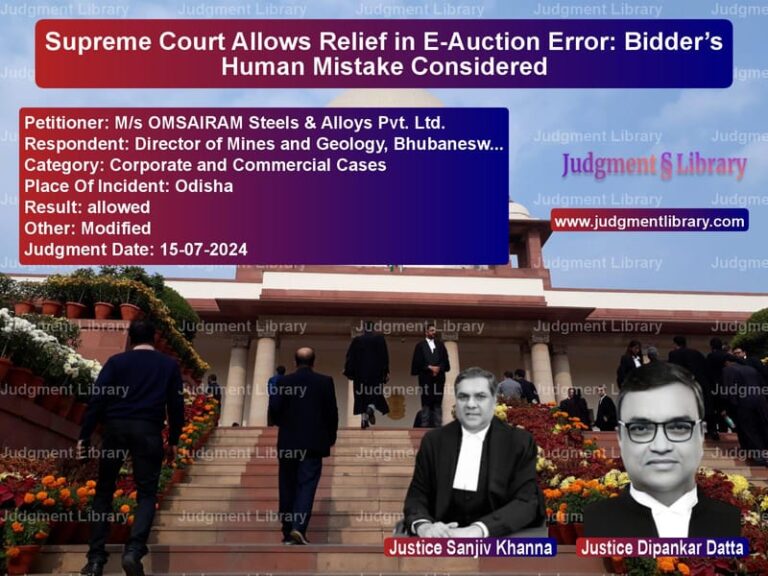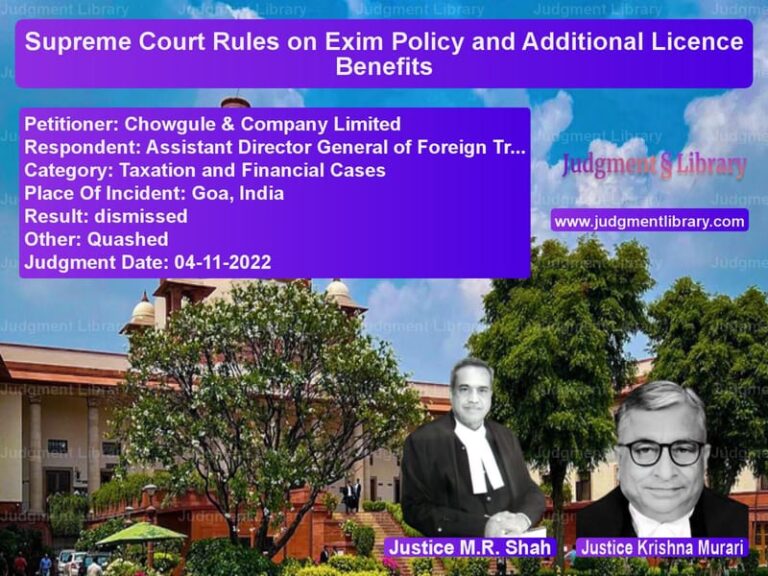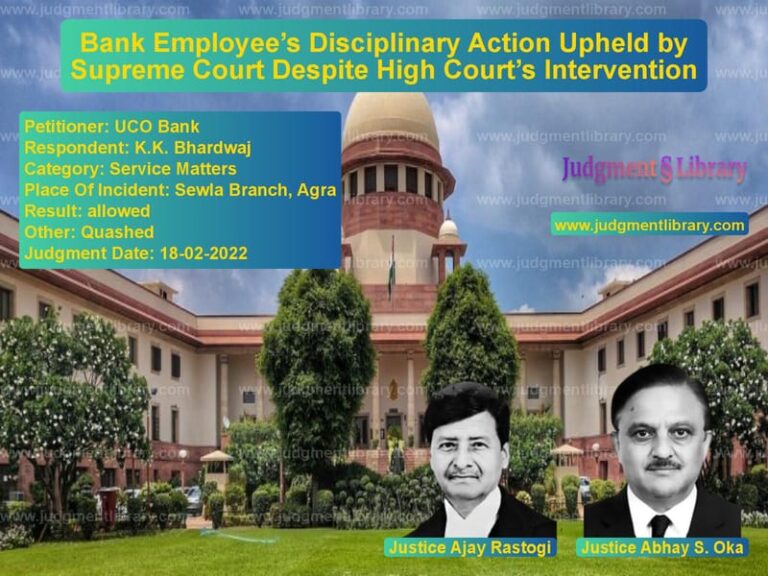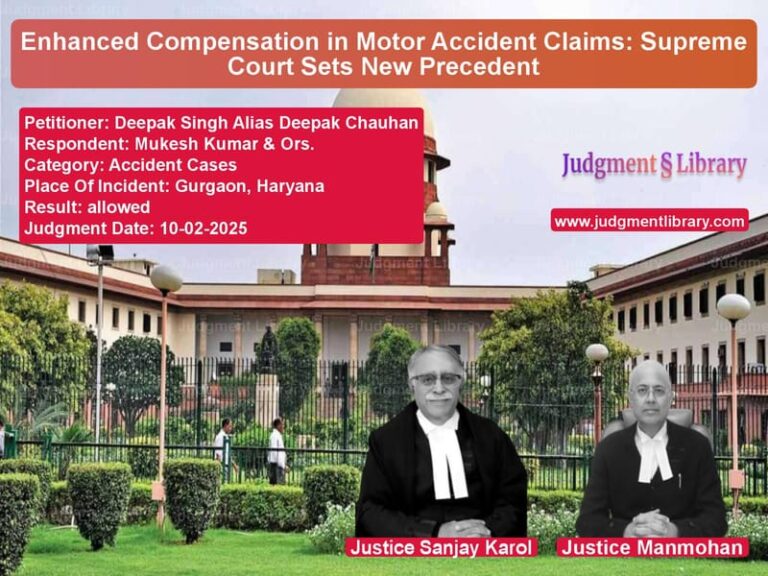Supreme Court Upholds Fair Compensation for Land Acquisition: Landmark Decision on Consent Awards
The Supreme Court of India recently ruled on the case of Mitesh Kumar Ramanbhai Patel & Ors. vs. State of Gujarat & Ors., addressing significant issues surrounding land acquisition and consent awards. The judgment focused on whether the government could rely on decades-old consent agreements to determine compensation and whether landowners could challenge such agreements based on changed circumstances.
The Court ruled in favor of the landowners, holding that compensation should be determined based on the market value prevailing at the time of the Section 4 notification under the Land Acquisition Act, 1894. The decision set aside the High Court’s ruling and restored the compensation awarded by the Reference Court, ensuring that landowners received fair compensation.
Background of the Case
The dispute arose from the acquisition of land in Gujarat, where the government relied on consent agreements signed in 1989. However, the formal acquisition process under Section 4 of the Land Acquisition Act did not begin until 1996, nearly seven years later. This delay led to significant changes in land value, and landowners contended that they should be compensated based on the prevailing market rate at the time of acquisition.
The Reference Court ruled in favor of the landowners, awarding compensation at a rate of Rs. 21.48 per square meter, significantly higher than the outdated rate of Rs. 3.12 per square meter mentioned in the old consent agreements. However, the Gujarat High Court set aside this decision, prompting the landowners to appeal to the Supreme Court.
Arguments of the Petitioners (Landowners)
- The petitioners argued that their consent was obtained in 1989 under fraudulent circumstances, as they had signed blank forms that were later filled with outdated compensation figures.
- They contended that it was unfair to enforce agreements that were nearly a decade old when land prices had increased significantly.
- They pointed out that compensation should be determined based on the market rate prevailing at the time of the Section 4 notification (1996), not when the consent agreements were signed.
- The Reference Court had correctly ruled that the agreements were unenforceable due to the time gap, and the Supreme Court should uphold this finding.
Arguments of the Respondents (State of Gujarat)
- The government argued that the landowners had voluntarily signed the consent agreements and had already received 80% to 90% of the compensation based on those agreements.
- They contended that the consent awards were legally binding, and no reference could be sought under Section 18 of the Land Acquisition Act.
- The government also maintained that since rent had been paid for the land occupation, the agreements should be considered valid.
Supreme Court’s Analysis and Judgment
The Supreme Court analyzed the case in depth and ruled in favor of the landowners, restoring the judgment of the Reference Court.
1. Validity of the Consent Agreements
The Court observed that the consent agreements were signed in 1989, but the formal acquisition process did not begin until 1996. During this period, land prices had significantly appreciated. The Court stated:
“It would be highly unfair in the facts of the instant case to ask the landowners to abide by the consent terms executed way back in the year 1989 and to hand over land to the State Government at the rate which prevailed in 1989.”
2. Right to Fair Compensation
The Supreme Court reaffirmed that compensation should be based on the market value prevailing at the time of acquisition, not at the time of consent agreements. The Court emphasized:
“The relevant date of determination of compensation is the date of issuance of notification under Section 4 of the Act. It was incumbent upon the State Government to obtain fresh consent forms in view of repudiation made in 1995.”
3. Unfair Delay in Land Acquisition
The Court criticized the government for delaying the acquisition process and attempting to rely on outdated agreements:
“The State Government had not taken the steps for seven years for acquisition of the land by issuance of the Notification under Section 4 of the Act.”
4. Compensation Enhancement
The Supreme Court upheld the Reference Court’s ruling that landowners should be compensated at the rate of Rs. 21.48 per square meter. The Court dismissed the argument that paying rent for occupation negated the need for additional compensation.
5. Final Ruling
The Supreme Court allowed the appeals and set aside the Gujarat High Court’s judgment. The Court restored the Reference Court’s compensation award and ordered:
- Any remaining compensation should be paid within three months.
- The respondents (State of Gujarat) must pay Rs. 10,000 in costs to each of the appellants.
Conclusion
The Supreme Court’s ruling is a significant decision in land acquisition cases, reinforcing the principle that compensation must reflect the prevailing market value at the time of acquisition. The judgment prevents governments from enforcing outdated agreements to the detriment of landowners and ensures that those whose lands are acquired are compensated fairly.
This ruling sets an important precedent, ensuring that procedural delays do not result in unfair financial losses for landowners. By upholding the Reference Court’s decision, the Supreme Court has reaffirmed the right of landowners to challenge outdated and unfair consent agreements.
Don’t miss out on the full details! Download the complete judgment in PDF format below and gain valuable insights instantly!
Download Judgment: Mitesh Kumar Ramanbh vs State of Gujarat & O Supreme Court of India Judgment Dated 16-11-2017.pdf
Direct Downlaod Judgment: Direct downlaod this Judgment
See all petitions in Property Disputes
See all petitions in Damages and Compensation
See all petitions in Contract Disputes
See all petitions in Judgment by Arun Mishra
See all petitions in Judgment by Mohan M. Shantanagoudar
See all petitions in allowed
See all petitions in supreme court of India judgments November 2017
See all petitions in 2017 judgments
See all posts in Civil Cases Category
See all allowed petitions in Civil Cases Category
See all Dismissed petitions in Civil Cases Category
See all partially allowed petitions in Civil Cases Category







